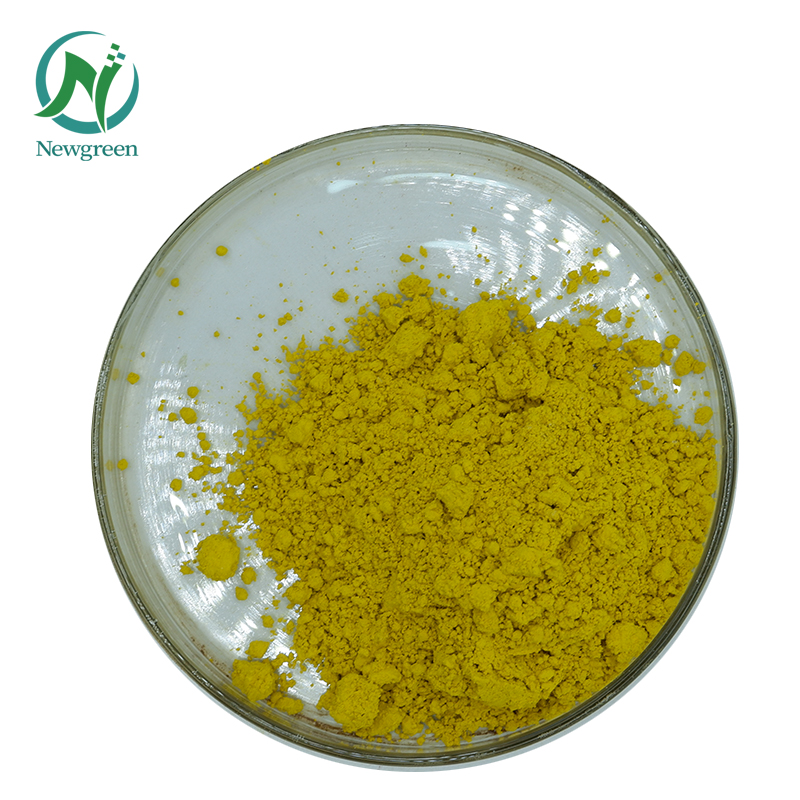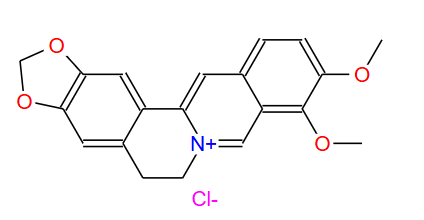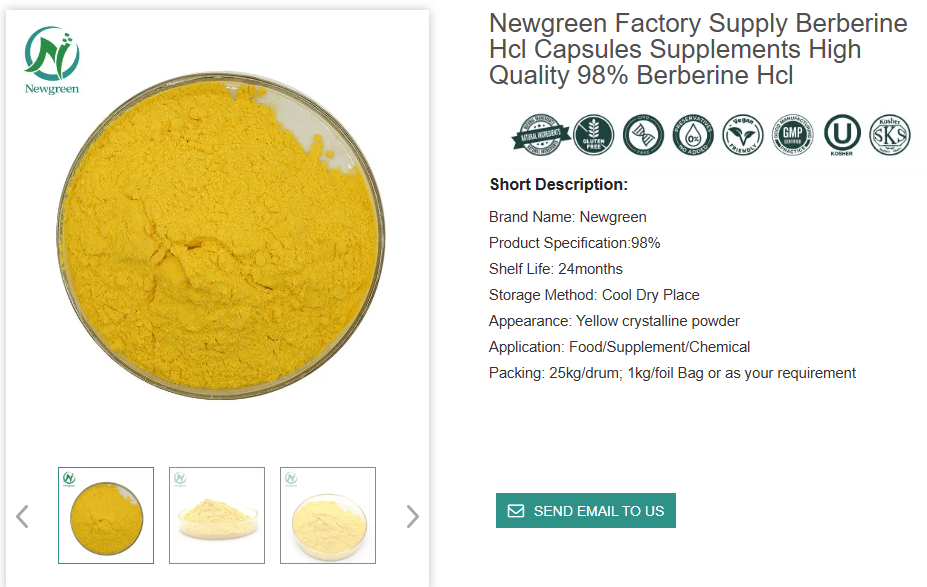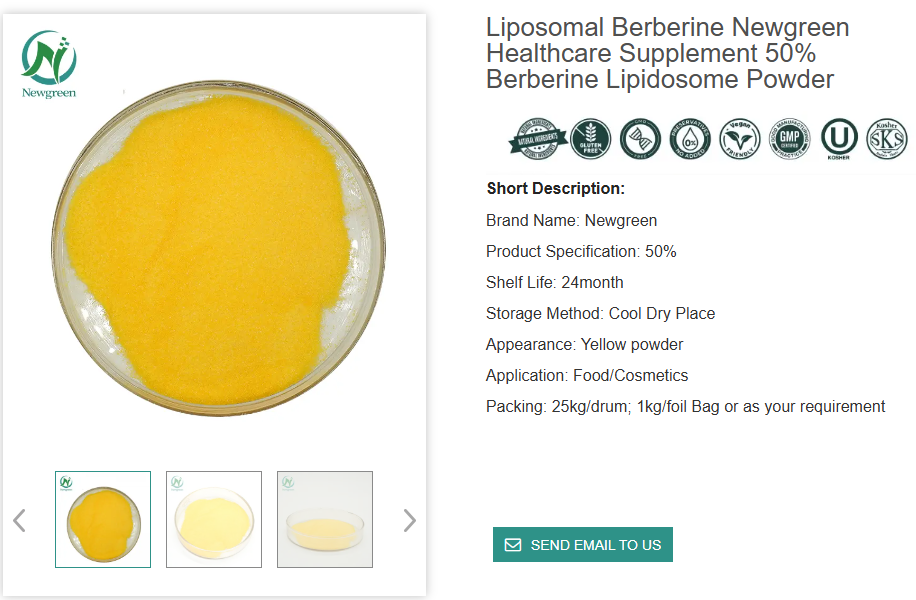
● What Is Berberine?
Berberine is a natural alkaloid extracted from the roots, stems and barks of various plants, such as Coptis chinensis, Phellodendron amurense and Berberis vulgaris. It is the main active ingredient of Coptis chinensis for antibacterial effect.
Berberine is a yellow needle-shaped crystal with a bitter taste. The main bitter ingredient in Coptis chinensis is berberine hydrochloride. This is an isoquinoline alkaloid distributed in various natural herbs. It exists in Coptis chinensis in the form of hydrochloride (berberine hydrochloride). Studies have found that this compound can be used to treat tumors, hepatitis, cardiovascular diseases, hypertension, inflammation, bacterial and viral infections, diarrhea, Alzheimer's disease and arthritis.


● What Are The Health Benefits of Berberine?
1.Antioxidant
Under normal conditions, the human body maintains a balance between antioxidants and prooxidants. Oxidative stress is a harmful process that may be an important mediator of cell structure damage, thereby inducing various disease states such as cardiovascular disease, cancer, neurological diseases and diabetes. Excessive production of reactive oxygen species (ROS), most commonly through excessive stimulation of NADPH by cytokines or through the mitochondrial electron transport chain and xanthine oxidase, can lead to oxidative stress. Experiments have shown that berberine metabolites and berberine show excellent -OH scavenging activity, which is roughly equivalent to the potent antioxidant vitamin C. Administration of berberine to diabetic rats can monitor the increase in SOD (superoxide dismutase) activity and the decrease in MDA (a marker of lipid peroxidation) levels [1]. Further results show that the scavenging activity of berberine is closely related to its ferrous ion chelating activity, and the C-9 hydroxyl group of berberine is an essential part.
2.Anti-tumor
There have been a lot of reports on the anti-cancer effect of berberine. Various studies in recent years have shown that berberine is of great significance in the adjuvant treatment of serious cancer diseases such as ovarian cancer, endometrial cancer, cervical cancer, breast cancer, lung cancer, colorectal cancer, kidney cancer, bladder cancer, and prostate cancer [2]. Berberine can inhibit the proliferation of tumor cells by interacting with various targets and mechanisms. It can change the expression of oncogenes and carcinogenesis-related genes to achieve the purpose of regulating the activity of related enzymes to inhibit proliferation.
3.Lowering Blood Lipids And Protecting Cardiovascular System
Berberine plays a vital role in the treatment of cardiovascular diseases and has a wide range of applications. Berberine achieves the purpose of anti-arrhythmia by reducing the incidence of ventricular premature beats and inhibiting the occurrence of ventricular tachycardia. Secondly, dyslipidemia is a major risk factor for cardiovascular disease, characterized by elevated levels of total cholesterol, triglycerides, and low-density lipoprotein cholesterol (LDL), and decreased levels of high-density lipoprotein (HDL), and berberine can strongly maintain the stability of these indicators. Long-term hyperlipidemia is an important cause of atherosclerotic plaque formation. It is reported that berberine affects LDL receptors in hepatocytes to reduce human serum cholesterol levels in hepatocytes. Not only that, berberine has a positive inotropic effect and has been used to treat congestive heart failure.
4.Lowers Blood Sugar And Regulates Endocrine
Diabetes mellitus (DM) is a metabolic disorder characterized by elevated blood sugar levels (hyperglycemia) caused by the inability of pancreatic B cells to produce enough insulin, or the loss of effective target tissue response to insulin. The hypoglycemic effect of berberine was discovered accidentally in the 1980s in the treatment of diabetic patients with diarrhea.
Many studies have shown that berberine lowers blood sugar through the following mechanisms:
● Inhibits mitochondrial glucose oxidation and stimulates glycolysis, subsequently increasing glucose metabolism;
● Reduces ATP levels by inhibiting mitochondrial function in the liver;
● Inhibits the activity of DPP 4 (a ubiquitous serine protease), thereby cleaving certain peptides that act to increase insulin levels in the presence of hyperglycemia.
● Berberine has a beneficial effect on improving insulin resistance and glucose utilization in tissues by reducing lipids (especially triglycerides) and plasma free fatty acid levels.
Summary
Nowadays, berberine can be synthesized artificially and modified by crystal engineering methods. It has low cost and advanced technology. With the development of medical research and the deepening of chemical research, berberine will surely show more medicinal effects. On the one hand, berberine has not only achieved remarkable results in traditional pharmacological research in antibacterial, antiviral, anti-inflammatory, anti-tumor, anti-diabetic, and treatment of cardiovascular and cerebrovascular diseases, but also its crystal engineering design and morphological analysis have received extensive attention. Due to its significant efficacy and low toxic and side effects, it has great potential in clinical application and has broad prospects. With the development of cell biology, the pharmacological mechanism of berberine will be clarified from the cellular level and even the molecular and target levels, providing more theoretical basis for its clinical application.
● NEWGREEN Supply Berberine /Liposomal Berberine Powder/Capsules/Tablets


Post time: Oct-28-2024





